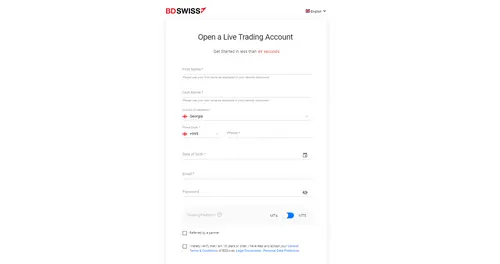BDSwiss is an international broker offering financial services to more than 1.5 million registered trading accounts. With this broker, traders have access to trading Forex, commodities, indices, cryptocurrencies, and shares as CFDs.
BDSwiss is authorized and regulated by the Financial Services Authority of Seychelles. It’s worth mentioning that the regulator is not a strict one, and there’s no other regulatory body that supervises the broker.
What sets BDSwiss apart from the competition is the variety of account types it offers. There are many different types of traders and to meet the needs of all sorts of investors, the broker offers four types of accounts: Cent, Classic, Raw, and VIP.
Let’s dive deep and find out more about this broker. We’ll discuss regulations, trading software, support, assets offered, and more. In addition, we’ll guide you through the live account opening process in detail.
Here are the 6 pros and cons:
- Cent account and 10 USD initial deposit requirements
- Offers access to MetaTrader 4, MetaTrader 5
- Fast and digital account opening/verification
- Offers access to over 250 trading assets
- Number of regulators is limited to only Seychelles
- Inactivity fee 10% of trading balance per month after 9 months of inactivity
BDSwiss Fact sheet
| Main features | |
| Regulations | Seychelles |
| Fees on deposits | 0 USD |
| Fees on withdrawal | 0 USD |
| Inactivity fees | 10% of the trading balance per month after 9 months of inactivity |
| Minimum deposit | 10 USD |
| Minimum account activation | 10 USD |
| Number of available assets | 250 |
| Leverage up to | 1:500 |
| Available trading markets | CFDs on Stocks, Commodities, Cryptocurrencies, Forex, Indices |
| Account currencies | EUR, USD, GBP, PLN, CHF, SEK, DKK, NOK |
| Demo account | Yes |
| Live account types | Cent, Classic, Raw, VIP |
| Islamic account | Yes |
| Security | |
| Negative balance protection | Yes |
| Part of compensation fund | Yes |
| Keeps funds on segregated bank account | Yes |
| Assets | |
| Forex | 51 |
| Shares | 0 |
| Cryptocurrencies | 31 |
| Indices | 11 |
| Commodities | 7 |
| Total | 250 |
| Fees & spread | |
| Forex | From 0.00016 |
| Shares | N/A |
| Cryptocurrencies | From 0.00125 |
| Indices | From 0.34 |
| Commodities | From 0.045 |
| Software | |
| Platforms | MetaTrader 4, MetaTrader 5 |
| Mobile trading support | Yes |
| Mac device support | Yes |
| Commodities | Yes |
| Payment systems | |
| Payment methods | Bank Transfer, Credit/Debit Card, Neteller, Skrill, Sofort, iDeal |
| Minimum deposit | Bank Transfer, Credit/Debit Card, Neteller, Skrill, Sofort, iDeal |
| Minimum withdrawal | Bank Transfer, Credit/Debit Card, Neteller, Skrill, Sofort, iDeal |
| Withdrawal processing time | Instant |
| Time to open an account | 2 |








